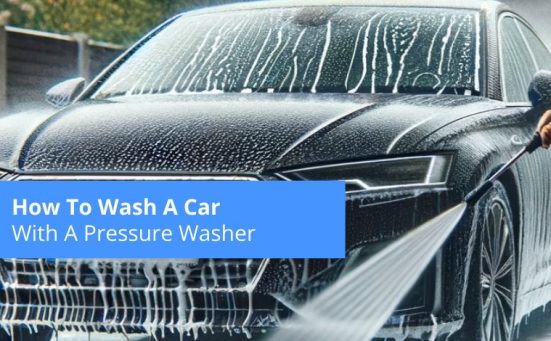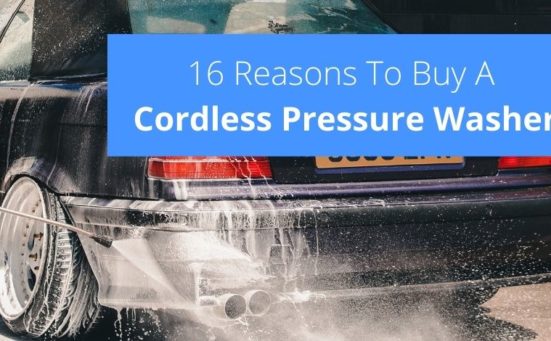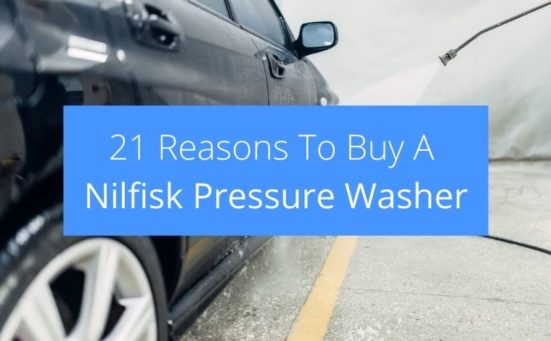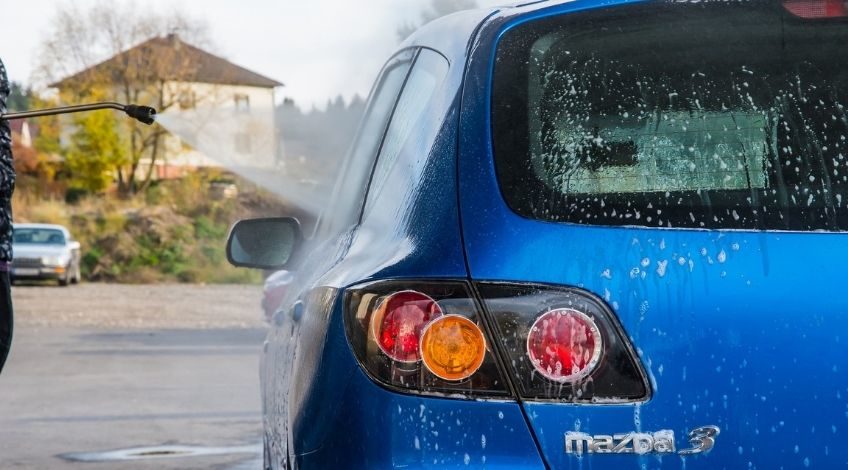 Last Updated: Jun 2024
Last Updated: Jun 2024 Best Petrol Pressure Washers UK 2024
If you’ve been looking at getting a pressure washer and you’ve read all the articles about which type to go for, and you’ve decided on a petrol pressure washer read on. Because we’ve looked at all the popular models that can be bought in the United Kingdom. It can be frustrating, looking up all the specs on the model you fancy, only to find that it’s not available over here unless you pay a hefty premium for shipping.
So we’ve checked that all of these models are readily available here in Great Britain. All you have to do is choose the model that best suits you. You’ll see we include all the specifications so you can compare these models side by side.
Best Selling Petrol Pressure Washers UK
- Powerful 7hp petrol engine produces 5600w, most DIY electric pressure washers are only 1400w to 2000w. 1.8L/h fuel consumption at full load.
- Generous large 12 inch puncture-proof wheels for easy transport.
- Powered by a Hyundai 420cc 4-stroke unleaded petrol engine: Provides easy starting, low emissions and reliable running in all weathers
- Annovi Reverberi (AR) pump producing 4000psi: For longer life as well as outstanding performance and reliability
- Powerful 7HP, 5.3Kw Wolf 4-stroke OHV petrol engine
- Mighty 210BAR pressure and a flow rate of 9 litres per minute
- Engine - It offers amazing pressure with its 7-horsepower engine. Advanced four-stroke OHV technology provides the perfect balance of high power output with an easy start and high efficiency.
- Wheels - With oversized never flat wheels, a strong yet lightweight tubular frame, a soft grip handle and rubber feet you can easily work in any terrain. The compact upright design and removable top handle ensure that both transport and storage are easy
- Maximum Pressure - 3100 PSI
- Wheeled chassis for added manoeuvrability
Top Petrol Pressure Washers Reviewed
Wilks Genuine USA TX750i Petrol Pressure Washer
Wilks hasn’t been making pressure washers for too long, but that doesn’t mean they don’t know what they’re doing. This model features a 4-stroke 8 horsepower engine, 272 bar pressure, 3950 PSi, 660 litres per hour (l/h) flow rate, 30-metre high-pressure hose, hose reel, 2 lances and hand tools, integrated 6-litre detergent tank, water filter system, onboard tool storage, 5 nozzles, and it’s on 12-inch wheels.
Parker Brand Petrol Pressure Washer
This Chinese made pressure washer has won numerous polls for the best budget pressure washers. It features a 4-stroke 6.5 horsepower engine, 3100 PSi, integrated detergent tank, 5 nozzles, 8-metre high-pressure hose, vibration reduction system, and a comfortable soft-grip handle.
Briggs & Stratton ELITE 3000 Petrol Pressure Washer
This American company has been around since 1908 and has a very strong record of manufacturing reliable petrol pressure washers. This model features 3000 PSi, 207 bar, 636l/h flow rate, easy start axial cam pump, thermal relief valve, 4 nozzles, solid wheels, 9-metre high-pressure hose, and a heavy-duty steel frame.
Wolf 3000psi Petrol Pressure Washer
This model is fairly small in comparison to some petrol-powered models but it’s a good value for money machine. It features a 4-stroke 6.5 horsepower engine, 480l/h flow rate, quick fit nozzles, easy to use trolley, detergent suction pump, 4 nozzles, 3000 PSi, and large, strong wheels.
Waspper W3000HA Petrol Pressure Washer
Made in Europe, the waspper is claimed by its manufacturer to outlast its competitors by 5 times. Features include metal spray gun, 3000 PSi, 220 bar, 510l/h flow rate, aluminium rust-resistant pump, 7.5-metre high-pressure hose, stainless steel extension lance, 3 nozzles, anti-vibration rubber bumpers, large plastic wheels, and it’s lightweight compared to any of its competitors.
Draper Expert PPW650
This British made machine is quality through and through, and features a 6.5 horsepower engine, 8-metre high-pressure hose, 474l/h flow rate, 2700 PSi, built-in detergent bottle, fold-down handle (for easy storage), 5 nozzles, and weighs 30 kg.
Honda GP 200
Honda has been making engines for many years and if you want a reliable, pressure washer this will fit the bill, they tend to be more expensive than some models but you’re buying a quality machine. It features a 6.5 horsepower 4-stroke engine, quieter engine (than some of their competitors), low oil detector, 5 quick-release nozzles, 3000 PSi, 206 bar, 10-metre high-pressure hose, axial pump, 10-inch wheels, easily accessible spare parts, and weighs 42 kg.
Hyundai HYW4000P
Hyundai is another one of those well-known companies that make reliable engines, and this 4-stroke model is no different. It features, 4000 PSi, triplex pump, pneumatic tyres, 900l/h flow rate, a detergent tank that mixes the correct ratios automatically, 14 horsepower engine, 15-metre high-pressure hose, 5 nozzles, strong, solid frame, and weighs 63 kg.
What Separates The Best Petrol Pressure Washer From The Rest?
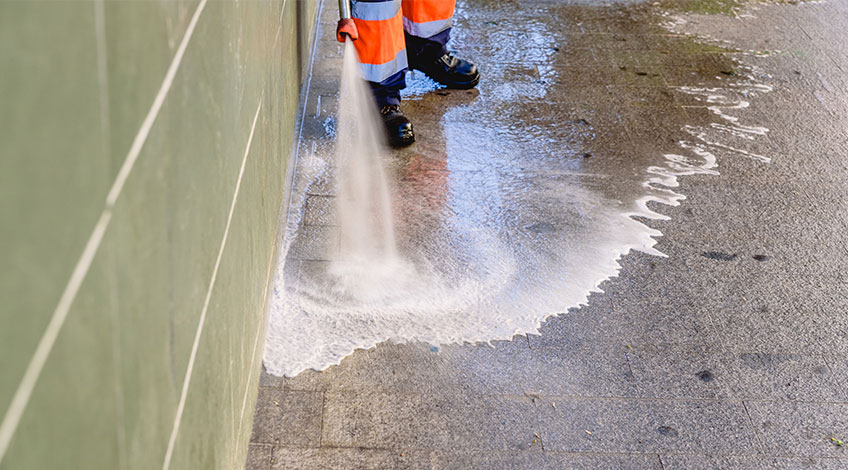
We think that a really good petrol-powered pressure washer should be easy to use, fuel-efficient and powerful enough to do the job it’s intended for. Electric-powered pressure washers are good value for money and many are powerful enough to cope with as much dirt and grime as you can throw at it. The main problems with electric pressure washers are you’re tied by the length of the power cable, and they don’t last more than a couple of years on average.
Petrol pressure washers are much more robust and can last for as long as 15 to 20 years. They can easily have parts replaced if say, the pump develops a fault. Whereas electric models will need to have the pump replaced, making petrol models a greener option when it comes to recycling.
How Do Petrol Pressure Washers Work?
The principles of how pressure washers work are very similar, both electric and petrol-powered pressure washers are fed with low-pressure water which is powered up by a motor and a pump and leaves the machine as high-pressure water. The most notable difference is in power, and when we say power we mean Pounds per Square inch (PSi).
Petrol models can produce almost double the PSi of electric models which means petrol models clean quicker and more efficiently. The majority of petrol models have a higher flow rate as well, which, when added to the extra power makes cleaning oil, grease or anything else a doddle. Plus petrol-powered models have greater mobility as they are not tied down by power cables.
Petrol-Powered Pressure Washers Buyers Guide
Before you rush into buying a petrol model, there are a few things to think about that might affect your decision. Firstly petrol models are considerably louder than electric models, they are heavier too as they are constructed of metal where electrics tend to be made of plastic. Think about where you’re planning on using your pressure washer the most, if it’s indoors or in an unventilated area, you don’t want a petrol engine pumping out exhaust fumes.
Carbon monoxide is known as the silent killer because you can’t see it, smell it or hear it. That’s what’s in your petrol-powered pressure washers exhaust fumes, so it should only ever be used outdoors. Thinking about fuel, you’ll need to keep petrol, engine oil, and pump oil handy as these will need topping up on occasion.
Plus the engine will need a service at regular intervals, these can usually be done at home, but they take time, energy and money. Here are a few of the relevant points to consider before you buy a petrol pressure washer.
PSi
This is the way the power of the pressurised water is measured. It’s an industry standard measurement and the letters stand for Pounds per Square inch. The higher the PSi the faster the pressure washer will clean the surface.
Petrol pressure washers have higher PSi than electric models, but not all petrol models are equal. If speed is important to you, then choose a model with a high PSi.
Horsepower
This is how engine power is measured. It goes back to the days of horse drawn carriages, the more horses pulling the carriage, the more power it had. Now it’s used to measure an engine’s power rating. The horsepower will affect fuel consumption but the higher the horsepower the more powerful the engine will be.
Flow rate
Flow rate is usually measured in litres per hour (L/H). This is how much water flows through the machine in an hour. Dependent on how powerful the engine is and how efficient the water pump can deal with the water, will determine the flow rate. Higher flow rate plus high PSi equals more powerful water pressure and a faster cleaning time.
Nozzles
Different manufacturers use different systems for nozzles, most use the colour coded system (shown below), but some just have their own versions that are usually controlled by twisting the nozzle to change spray type (and power level).
| Nozzle colour | Function |
|---|---|
| Red (0 degrees) | Most powerful, used for hard to clear stains, high-up areas that are difficult to reach |
| Yellow (15 degrees) | For use on concrete, brick, and other hard porous surfaces and stubborn stains |
| Green (25 degrees) | For cleaning painted surfaces,wood, fences,garden furniture etc. |
| White (40 degrees) | For cleaning glass, windows, screens etc. |
| Black (65 degrees) | The least powerful spray, used for applying detergents |
Weight
The larger models with the highest horsepower, flow rate etc also tend to be the heaviest machines too. Most have wheels but if they weigh 50 kg you still have to move 50 kg.
Maneuverability
You’re going to have to move your pressure washer about, even if it’s just from the shed to the drive. It needs to be easy to move, most petrol models are on wheels and that makes it easier to move them. But the larger the wheels are, the easier it’s going to be to move, but larger wheels mean it’ll take up more storage space.
No one model is going to be perfect, you need to find the best compromise for your situation.
Manufacturer
It always pays to go with a well trusted, reputable manufacturer. Not only will they have years of experience in the manufacture of pressure washers, and have updated models with better functionality. But they will also have better customer service departments in the unlikely event of any major problems.
Warranty
Many petrol pressure washers come with a 3 year warranty subject to T&Cs. Some have less but whatever guarantee you receive with your machine is only as good as the company that issues it. That’s why we recommend buying a well known brand from a reputable retailer.
If you do get a problem, you need to have confidence that the company are still running in 18 months to 2 years time.
Petrol Pressure Washer Prices UK
We have deliberately omitted the prices on these petrol-powered pressure washers because just by doing one quick search on google, you can save upwards of between £60 to £80. Look for sales, special offers and free delivery. We have only mentioned the models we consider to be worthy of being included in the best petrol pressure washers UK guide.
There are other makes and models available, but we are confident that the models featured on this page are genuinely available here in the United Kingdom and represent true value for money.
Petrol Pressure Washers Costs To Run
Running costs on petrol pressure washers can be worked out, if you know the prices of water and petrol and how long it takes to do the job. So let’s imagine it takes 10 minutes to pressure wash your drive. Your flow rate average is 480 l/h which works out at 8 litres per minute.
The average cost of water in the UK is 0.1 pence per litre, so the water used in our example is going to cost 0.8 pence (or less than 1 pence).
The average price of a gallon of petrol in the UK is £4.50 and the average petrol pressure washer uses around 1 gallon per hour. Which means our 10 minute drive cleaning will cost 75 pence in fuel.
That gives us a total cost of around 76 pence to clean a drive in 10 minutes. Of course you’ll need to add engine oil, pump oil and maintenance but per usage these are minuscule.
Frequently Asked Questions
In many ways petrol pressure washers are better than electric models, they are more powerful, last much longer, have no cable to hold you back. But electric models tend to be better for smaller household cleaning like washing cars, drives, patios, barbeques etc.
You should use regular unleaded gas in your pressure washer. It should be fresh fuel (not sitting in a fuel can for months).
You can lower the PSi on many petrol pressure washers by turning the pressure regulator on the pump. Or just stand back as you are spraying and this will lower the PSi.
You can damage concrete with a pressure washer, if the power is too high or if you concentrate on one area for too long.
Petrol pressure washers last much longer than electric pressure washers. Typically 300 to 3000 hours compared to 50 to 100 hours with an electric model.
Petrol pressure washers do need oil. Engine oil to keep the engine parts running smoothly and many petrol models also need oil in the water pump.
Non-detergent oil goes in the pump of a pressure washer, this is because the pump has no filter, and if the oil had detergent added it would clog the pump.
Pressure washer pumps can be rebuilt, if you need to replace a part in your pump it can usually be bought online and fitted at home.
Pressure washer tips are not universal, although most manufacturers use the same colour coding system, the fittings are often only suitable for that company’s models.
Pressure washer hoses usually burst due to misuse. It’s a common misconception that pressure washer hoses are really strong and can be run over by cars etc.
You should change the oil in a pressure washer every 200 to 250 hours or once a year at least. That’s both engine oil, and pump oil.
Pressure washer pump oil is not the same as engine oil although they both do the job of lubrication, they have different properties. Pump oil does not have any detergent additives, engine oil does. Engines have an oil filter to catch and remove dirt etc. from the oil. Water pumps have no filter, using engine oil on a pressure washer water pump will damage the pump.
All pressure washer pumps need oil, some are sealed units and therefore cannot be topped up with oil. But on petrol pressure washers the water pump has a filler cap to top up oil when necessary.






